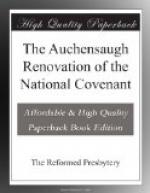Likeas, many acts of parliament are conceived for maintenance of God’s true Christian religion, and the purity thereof in doctrine and sacraments of the true church of God, the liberty and freedom thereof in her national synodical assemblies, Presbyteries, sessions, policy, discipline, and jurisdiction thereof, as that purity of religion and liberty of the church was used, professed, exercised, preached, and confessed according to the reformation of religion in this realm. As for instance, the 99th Act, Parl. 7, Act 23, Parl. 11; Act 114, Parl. 12; Act 160, Parl. 13, King James VI., ratified by the 4th Act of King Charles. So that the 6th Act, Parl. 1, and 68th Act, Parl. 6, of King James VI., in the year of God 1579, declares the ministers of the blessed evangel, whom God of his mercy had raised up, or hereafter should raise, agreeing with them that then lived in doctrine and administration of the sacraments, and the people that professed Christ as he was then offered in the evangel and doth communicate with the holy sacraments, (as in the reformed kirks of this realm they were publickly administrate) according to the Confession of Faith, to be the true and holy kirk of Christ Jesus within this realm, and decerns and declares all and sundry who either gainsay the word of the evangel, received and approved as the heads of the Confession of Faith, professed in parliament in the year of God 1560, specified also in the first Parliament of King James VI, and ratified in this present parliament; more particularly do specify, or that refuse the administration of the holy sacraments as they were then administered, to be no members of the said kirk within this realm, and true religion presently professed, so long as




